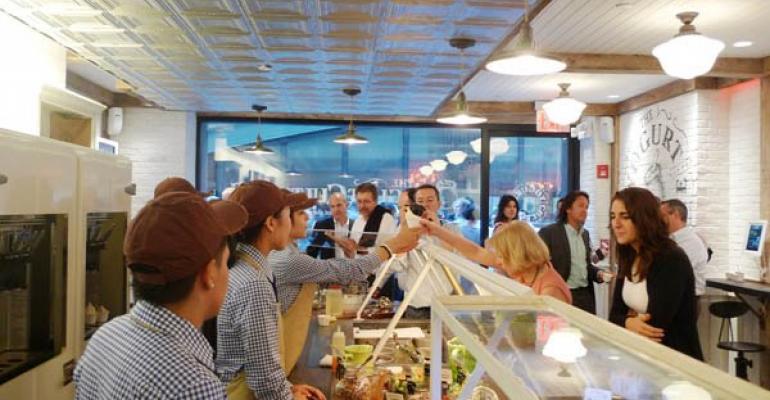Will we see more operator-friendly products and services flowing from foodservice manufacturers Dannon and Smithfield Foods now that they’ve gone into the restaurant business for themselves? Both companies are angling to get consumer feedback on their products, but we’re betting they’ll come away with a new understanding of just how tough it is to make a buck in this industry.
Why restaurants? It’s a long and costly process for foodservice manufacturers to test and tweak products until they’re just right. That’s true even for companies the size of Dannon (parent firm Danone has annual revenues of around $18 billion) and Smithfield (a $13 billion company). Now each will get a daily lesson about how well their products work from both the operator and customer perspective.
Each company has taken a much-different approach to entering the restaurant business.
Smithfield Foods features its extensive product lineup of packaged pork products at the new Taste of Smithfield restaurant. It’s located in, where else, Smithfield, VA, the company’s hometown. Taste of Smithfield shares an 8,700 sq. ft. building with Genuine Smithfield Ham Shoppe, a retail outlet that sells a mix of Smithfield Foods products and other Virginia-made gourmet items.
The restaurant’s 43-item menu features plenty of Smithfield pork products. But there are also a trio of meatless options and four burger choices for those looking for something other than pork. Items are priced in the $8-$12 range. It’s an order-at-the-counter restaurant that offers regional craft beers and wines and makes its desserts in-house. Taste of Smithfield opens at 9 a.m. and serves lunch and dinner.
How will it do? Smithfield, VA bills itself as the “Ham Capital of the World” and attracts a steady flow of tourists year round. A restaurant named Taste of Smithfield should attract plenty of patrons.
In contrast, the Dannon venture downplays its corporate connection and doesn’t feature many of the products the company is best known for. Its restaurant subsidiary is called The Yogurt Culture Company and is located in the high-rent district of Manhattan: 125 Park Ave, just south of Grand Central Station.
There’s plenty of yogurt for sale at this restaurant, but it’s not the Dannon kind you see in supermarkets or buy in bulk for your restaurant. In part, the Yogurt Culture Company offers small-batch yogurt produced at the company’s Discovery and Innovation Center in nearby Westchester, NY. Both Greek-style and traditional yogurts are available in either whole or skim milk versions. There’s frozen yogurt for dessert, too, sourced from an outside supplier.
The service format is counter-style and allows customers to customize their selection. Patrons approach the store’s yogurt bar and select one of the available yogurts, then choose a fruit puree plus some fresh fruit, granola or a nut topping to finish off their dish. Restaurant staffers prepare the item and serve it in one of three formats: a classic yogurt cup, a yogurt parfait or smoothie-style. The cost: $5.49. Other menu items are available, but don’t stray far from the yogurt theme. Takeout cases offer sandwiches made with yogurt cheeses and organic meets and fresh salads made with yogurt dressings. Fresh-pressed juices and yogurt-based pastries round out the product lineup.
The shop is open from 7 a.m. to 7 p.m. during the week, 8. a.m. to 7 p.m. on weekends. The location has dense foot traffic on weekdays; Saturday and Sunday may prove to be more challenging in this particular part of New York.
“This idea has been a dream for a while, now,” said Eric O’Toole, president of The Yogurt Culture Company, a Dannon subsidiary. “We’re very excited to open our doors because we think New Yorkers will be thrilled to have a truly fresh food option for their fast meals. It’s a fresh, handcrafted experience we think our guests really will respond to.”
Whatever money Smithfield and Dannon make or lose operating these one-off restaurant ventures will be more than outweighed by the public relations value of the units and the information gained about consumer acceptance, not to mention how well each company’s products perform in a real-world restaurant setting.
On this latter score, it will be interesting to see if other foodservice manufacturers decide to operate their own restaurant, or perhaps food truck, soon. The street-level feedback is priceless.




